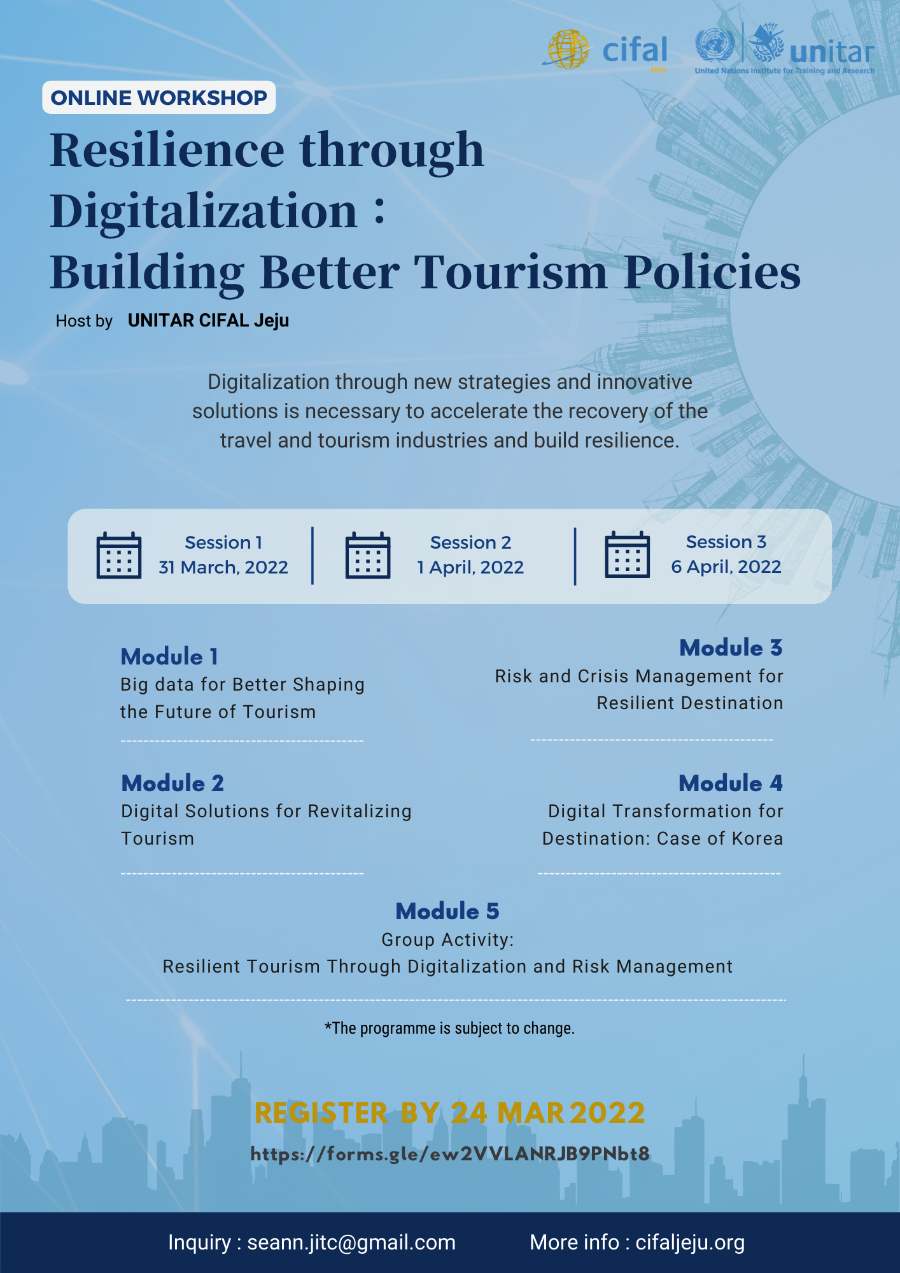Likewise, CIFAL Jeju/JITC has expanded its scope of workshops to include various aspects of economic development, such as sustainable urbanization, tourism, entrepreneurship, rural and agricultural development, smart city, green finance, and so on.

 2022.07.28
2022.07.28
|
Resilience through Digitalization: Building Better Tourism Policies
March 31, April 1 & 6, 2022
|
|
Date |
Time
(GMT+9) |
Program |
|
Session 1
31 Mar (Thu)
16:00-18:00 |
16:00
(10 mins) |
Opening
-Opening Remarks
by Hong-ghi Choi, Director of CIFAL Jeju |
|
16:10
(20 mins) |
[Module 1]
Big Data for Better Shaping the Future of Tourism
Mr Matthias Helble, Senior Economist
Economic Research and Regional Cooperation Department
Asian Development Bank (ADB) |
|
|
16:30
(20 mins) |
[Module 2]
Destination Transformation: Digital Strategy and Benchmarking
Mr Nick Hall, Founder & CEO
Digital Tourism Think Tank |
|
|
16:50
(10 mins) |
Plenary session and Q&A
|
|
|
17:00
(30 mins) |
[Module 3]
Risk and Crisis Management for Resilient Destination
Mr Graham Harper
Director of Sustainability & Social Responsibility
Pacific Asia Tourism Association |
|
|
17:30
(20 mins) |
[Module 4]
Digital Transformation for Destination: Case of Korea
Mr Joon-ho Lee, Deputy Director
Digital Innovation Team, Korea Tourism Organisation (KTO) |
|
|
17:50
(10 mins) |
Plenary session and Q&A |
|
|
Session 2
1 Apr (Fri)
13:00-15:00 |
13:00
(10 mins) |
Introduction and Review
|
|
13:10
(80mins) |
[Module 5]
Group activity: Tourism Policy Action Plan Framework
Digital Tourism Think Tank |
|
|
14:30
(20 mins) |
Group work
|
|
|
14:50
(10 mins) |
Closing of Session 2 |
|
|
Session 3
6 Apr (Wed)
14:00-16:00 |
14:00
(1hr45mins) |
Group presentation
*Experts’ feedback provided on each group’s presentation |
|
15:55
(5 mins) |
Closing of Session 3 |
*The programme is subject to change.*The programme is subject to change.
Application and deadline
· Submit the google format at https://forms.gle/ew2VVLANRJB9PNbt8 by March 24, 2022.
· Kindly note that only selected applicants will be notified individually.
Certificate
· A Certificate of Completion will be awarded to those who have completed two online sessions and fulfilled the required tasks for the program – e.g. group discussion and presentation on case studies
· The participants will be awarded a certificate jointly issued by UNITAR and UNITAR CIFAL Jeju.
Organizer
UNITAR CIFAL Jeju/Jeju International Training Center
Inquiry
Sung-eun Ann, Program Officer







